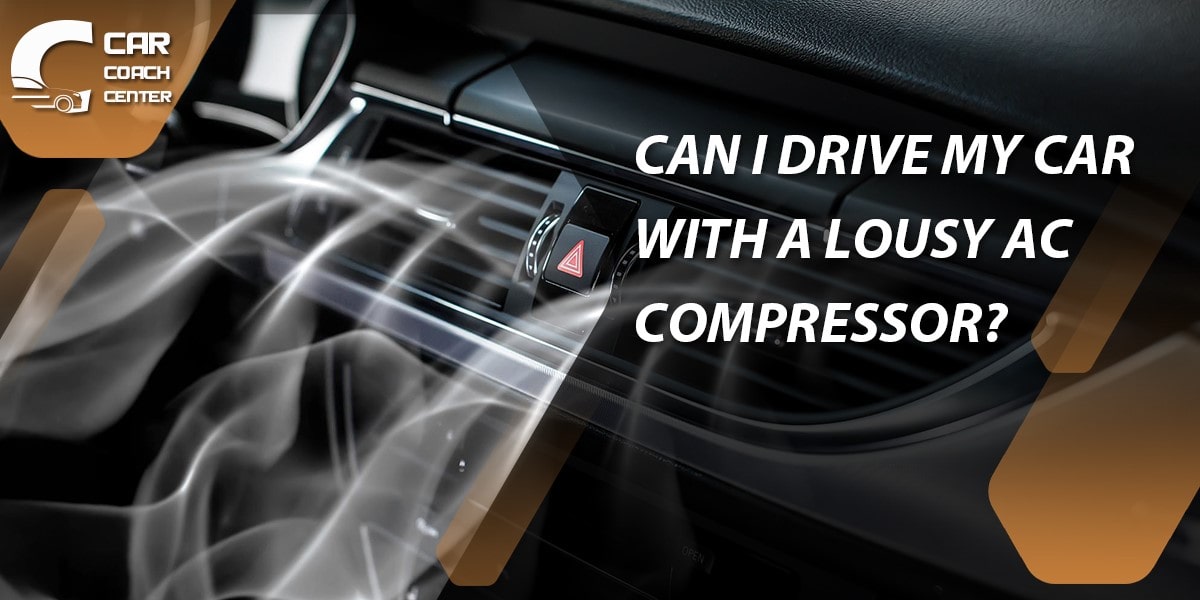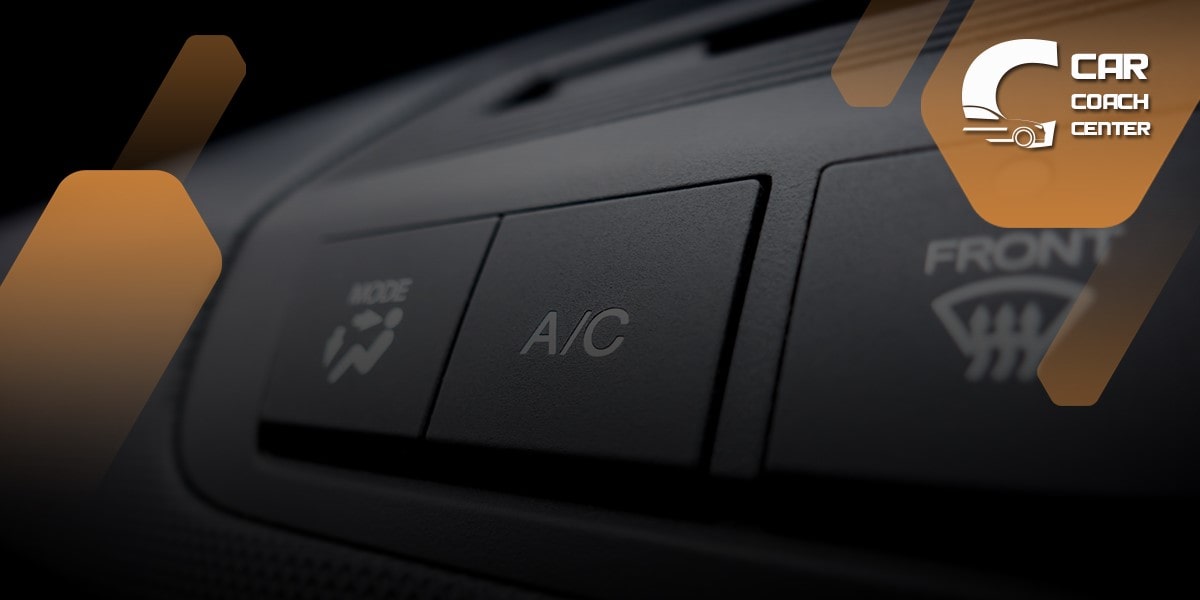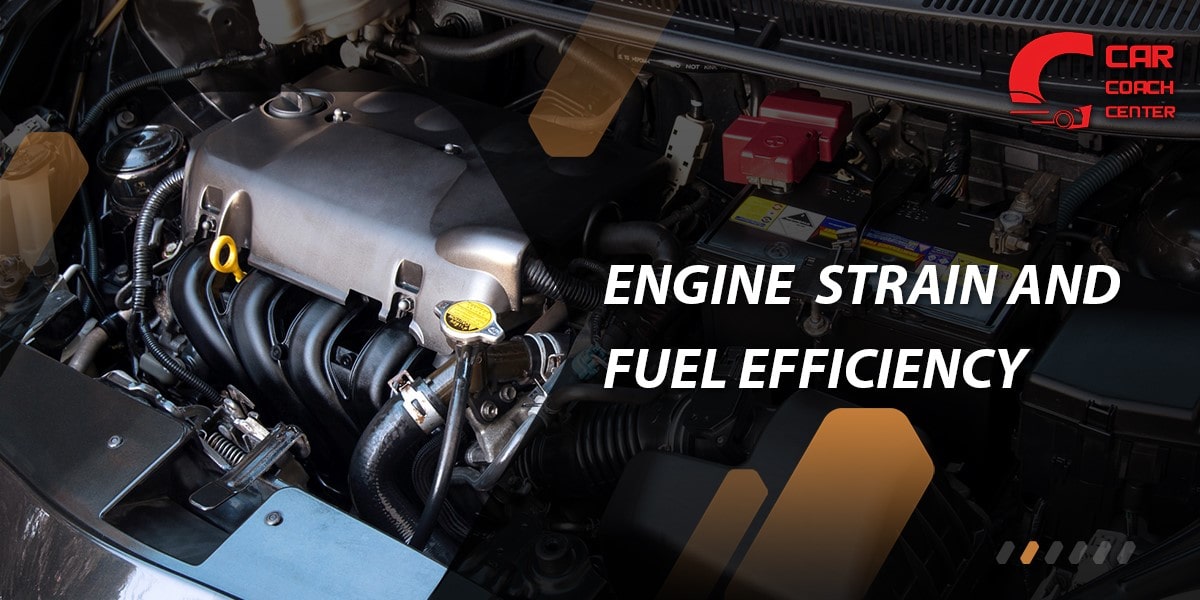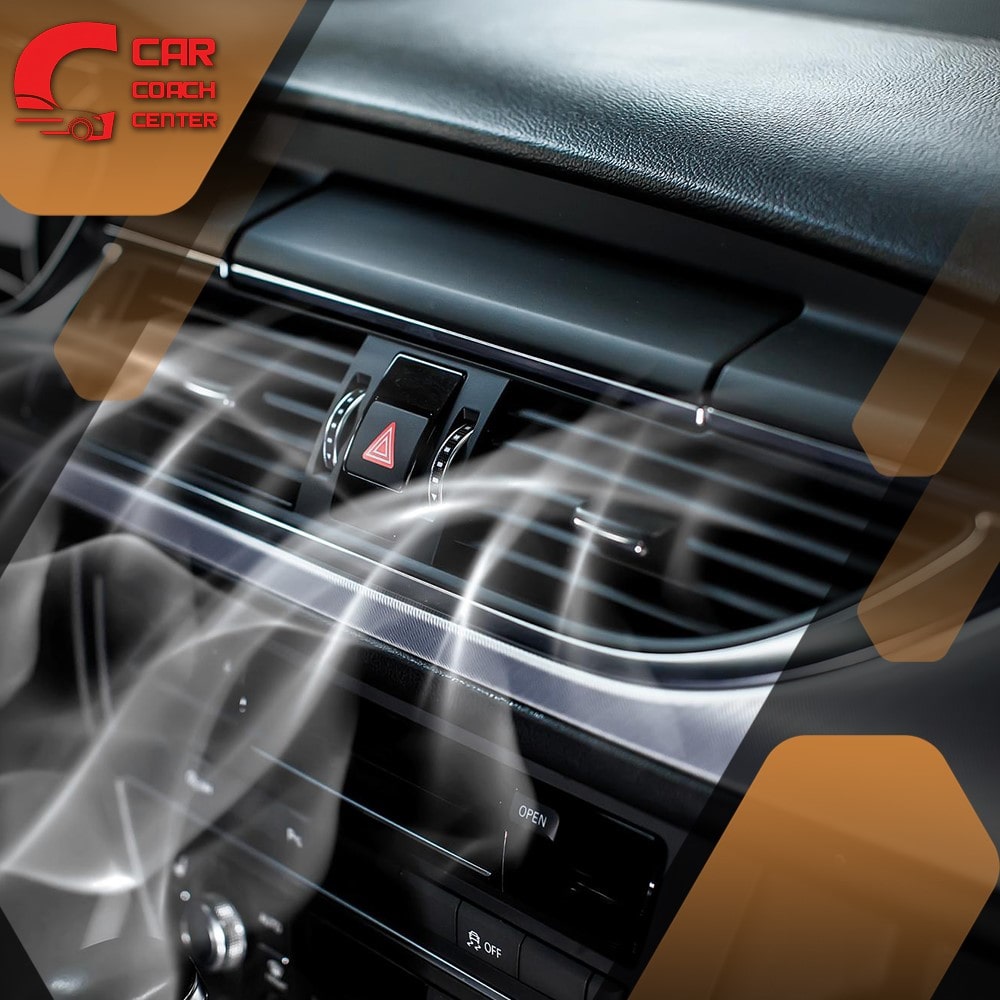Can I Drive My Car With A Bad Ac Compressor?
Regarding driving comfort, few things can rival the refreshing blast of cool air from your car’s air conditioning system on a sweltering summer day. However, what happens when your AC compressor starts acting up? Can you continue driving with a faulty AC compressor or address the issue immediately?
In this article, we will delve into the topic of going with a bad AC compressor and explore its potential consequences on your driving experience, vehicle performance, and overall safety. By understanding the signs of a malfunctioning AC compressor and the implications of ignoring the problem, you’ll be better equipped to make informed decisions regarding the maintenance and repair of your car’s cooling system. So, let’s dive in and uncover the facts about driving with a bad AC compressor.

Signs of a Bad AC Compressor
Your car’s AC compressor plays a vital role in the cooling process, and when it starts to fail, several noticeable signs may indicate a problem. Recognizing these signs can help you diagnose a faulty AC compressor and take appropriate action. Here are some common indicators:
Strange Noises
One of the primary signs of a bad AC compressor is unusual noises from the engine bay or the AC system itself. You may hear grinding, squealing, or rattling sounds when the compressor struggles to function correctly. These noises often indicate internal damage or a failing clutch.
Lack of Cool Air
If you’re experiencing reduced cooling or warm air blowing from the vents despite the AC system being on, it could clearly indicate a malfunctioning compressor. The compressor’s job is to compress and circulate refrigerant, so a failing unit may struggle to cool the air properly.
Leaking Refrigerant
AC systems use a closed-loop system to circulate refrigerant. If you notice refrigerant leaks or oily residue around the AC compressor or hoses, it suggests a potential problem. Leaks can occur due to a damaged compressor seal or worn-out components, and they should be addressed promptly to prevent further damage.
Constant Cycling On and Off
A faulty AC compressor may cause the system to cycle on and off more frequently than usual. This phenomenon, known as short cycling, disrupts the cooling process and prevents the system from maintaining a consistent temperature. If you observe rapid and frequent cycles of the AC turning on and off, it’s likely a sign of compressor trouble.
Unusual Odors
A malfunctioning AC compressor can also emit strange odors. If you notice a musty or foul smell when the AC is running, it could indicate mold growth or a refrigerant leak. Unpleasant odors should not be ignored, as they can indicate potential health hazards and require immediate attention.

Impact on Cabin Comfort
A fully functional AC compressor is essential for maintaining a comfortable cabin temperature during hot weather or long drives. When the AC compressor starts to malfunction, it can directly impact your driving comfort. Let’s explore the potential effects.
Inadequate Cooling
A bad AC compressor may need help to circulate refrigerant effectively, resulting in reduced cooling performance. As a result, the air blowing from the vents may feel warmer than desired, making it challenging to maintain a comfortable temperature inside the cabin. This can be particularly problematic during scorching summer days or in regions with high temperatures
Uneven Cooling
Another consequence of a malfunctioning AC compressor is uneven cooling throughout the cabin. You may notice that some regions of the vehicle, such as the driver’s side or the rear seats, receive less cool air than others. This disparity in cooling can lead to discomfort for passengers and make it challenging to maintain a consistent temperature for everyone inside the car.
Increased Humidity
Alongside its cooling function, the AC system dehumidifies the cabin’s air, helping reduce humidity levels. A faulty AC compressor may need help to effectively remove excess moisture from the air. As a result, you may experience higher humidity levels inside the car, leading to a clammy and sticky feeling, foggy windows, and a generally unpleasant atmosphere.
Extended Cooling Time
When the AC compressor is not functioning optimally, it may take longer for the system to cool down the cabin. This extended cooling time can be frustrating, especially when you’re in a hurry or trying to escape the heat quickly. It can also put additional strain on the other components of the AC system, potentially leading to further issues.
Discomfort during Long Drives
A malfunctioning AC compressor can significantly impact your comfort levels if you frequently embark on long road trips or extended drives. With a properly functioning AC system, you may find it easier to maintain a comfortable temperature during extended periods in the car. This discomfort can affect your overall driving experience and may contribute to fatigue.
Engine Strain and Fuel Efficiency
A bad AC compressor affects the comfort of your car’s cabin, places additional strain on the engine, and impacts fuel efficiency. Understanding the relationship between a faulty AC compressor and engine performance can help you make informed decisions about addressing the issue. Here’s how it can impact your vehicle.

Increased Engine Workload
The AC compressor is typically driven by a belt connected to the engine’s crankshaft. When the compressor is faulty, it may experience increased resistance or drag, requiring the engine to work harder to compensate. This extra workload can result in decreased engine efficiency and overall performance. The engine may struggle to deliver power, leading to sluggish acceleration and reduced responsiveness.
Reduced Fuel Efficiency
An engine under strain due to a faulty AC compressor consumes more fuel to compensate for the additional workload. The increased energy demands to power the compressor can significantly impact fuel efficiency, resulting in lower miles per gallon (MPG). Over time, this decrease in fuel efficiency can translate into higher fuel costs and more frequent visits to the gas station.
Potential Damage to Other Components
A malfunctioning AC compressor can have a cascading effect on other components within the engine system. The increased strain and workload on the engine can impact various related parts, such as the drive belt, pulleys, and even the engine itself. Neglecting a faulty AC compressor for an extended period may lead to premature wear and tear on these components, potentially resulting in more expensive repairs.
Overheating Risk
The AC system plays a crucial role in maintaining optimal engine temperature. A malfunctioning AC compressor can disrupt this cooling process, potentially leading to an increased risk of engine overheating. Overheating can cause severe damage to the engine, resulting in costly repairs or even engine failure. It is crucial to address AC compressor issues promptly to avoid such risks.
Potential Damage to the Cooling System
A bad AC compressor can have far-reaching consequences beyond just the cooling performance of your car. It can damage other components within the cooling system, posing risks to your vehicle’s overall health. Let’s explore the potential impacts.
Overheating
The AC compressor is closely tied to your vehicle’s cooling system. It helps regulate the temperature by circulating refrigerant and dissipating heat. When the compressor is faulty, it may be unable to perform its cooling functions effectively. This can result in increased engine temperatures and a higher risk of overheating. Overheating can cause significant damage to engine components, including gaskets, seals, and even the engine block itself.
Strain on Other Components
A bad AC compressor can put additional strain on various components within the cooling system. The increased resistance or drag caused by the faulty compressor can impact the drive belt, tensioners, and pulleys. This strain can lead to premature wear and tear on these parts, potentially failing. Addressing the faulty AC compressor promptly can help prevent unnecessary damage to these components.
Contamination of Refrigerant
In some cases, a malfunctioning AC compressor may experience internal damage that leads to refrigerant leakage. Refrigerant leaks can contaminate other cooling system parts, including the condenser, evaporator, and hoses. Contaminated refrigerant can impede the proper functioning of these components, reducing their efficiency and potentially causing further damage.

Expensive Repairs
Ignoring a bad AC compressor and allowing it to affect other cooling system parts can lead to more extensive and costly repairs. Components such as the condenser, evaporator, or even the entire cooling system may require replacement if they are damaged due to the faulty compressor. Overheating due to a malfunctioning AC compressor can also lead to severe engine damage, necessitating costly repairs or even engine replacement.
Overall System Performance
A healthy cooling system is crucial for the optimal performance of your vehicle. When the AC compressor is not functioning properly, it can disrupt the entire system’s balance. This can affect the cooling efficiency, engine performance, and overall vehicle reliability. Addressing a bad AC compressor promptly can help maintain the integrity and functionality of the cooling system.
To prevent potential damage to the cooling system, promptly addressing any signs of a faulty AC compressor is essential. Consult a qualified automotive technician who can accurately diagnose the issue and recommend the appropriate repairs or replacements. By taking proactive measures to maintain a healthy cooling system, you can avoid costly repairs, ensure optimal vehicle performance, and extend the lifespan of your car.
Safety Concerns and Visibility
A malfunctioning AC compressor can pose safety concerns and impact visibility while driving. It’s important to recognize how a faulty AC system can affect your safety on the road. Here are the key considerations:
Foggy Windshields
The AC system plays a crucial role in dehumidifying the air inside the cabin. Excess moisture can accumulate when the compressor is not functioning properly, leading to foggy windshields. Fogged-up windows significantly hinder visibility, making it difficult to see the road ahead and the surrounding traffic. This can compromise your safety and increase the risk of accidents, particularly in adverse weather conditions.
Defrosting Issues
In addition to cooling, the AC system also contributes to defrosting by removing moisture from the air. A faulty AC compressor can impede the defrosting capability, resulting in slower or insufficient windshield defrosting during colder conditions. This can create ice or frost buildup on the windshield, reducing visibility and making driving unsafe.
Driver Distraction
Uncomfortable cabin conditions, such as excessive heat or inadequate cooling, can lead to driver distraction. When you’re uncomfortable, your focus may shift from the road to the discomfort caused by a malfunctioning AC system. This distraction can impact your attentiveness, reaction time, and overall driving performance, increasing the chances of accidents.

Fatigue and Driver Comfort
Driving in a hot and uncomfortable cabin can contribute to driver fatigue, especially during long journeys. Fatigue affects alertness and impairs driving skills, posing a significant safety risk. A properly functioning AC system helps create a comfortable and pleasant driving environment, reducing fatigue and promoting driver attentiveness.
Allergens and Air Quality
A malfunctioning AC system can compromise the filtration and purification of air inside the cabin. This can allow allergens, pollutants, and unpleasant odors to enter the vehicle, potentially causing respiratory issues and discomfort for occupants. Maintaining a functional AC system with a proper compressor ensures a healthier and more comfortable environment inside the car.
Professional Diagnosis and Repair
When faced with a bad AC compressor, seeking professional diagnosis and repair is crucial to address the issue effectively. While some car owners may attempt DIY fixes, consulting with qualified mechanics or automotive technicians who specialize in AC systems is recommended. Here’s why professional expertise is essential:
Accurate Diagnosis
Automotive professionals have the knowledge, experience, and specialized equipment to diagnose AC compressor issues accurately. They can perform comprehensive inspections, conduct diagnostic tests, and identify the underlying causes of compressor malfunction. Their expertise ensures a precise assessment, allowing for targeted repairs or replacements.
Proper Repair Techniques
AC compressor repairs require specific skills and techniques. Professionals are familiar with the intricate workings of automotive AC systems and can perform repairs by manufacturer guidelines. They have access to the necessary tools and resources to ensure that the repair process is carried out correctly, minimizing the risk of further damage.
Quality Replacement Parts
Professionals can source high-quality, genuine parts from reputable suppliers if the AC compressor needs replacement. Using authentic components ensures compatibility and reliability, leading to a longer-lasting repair. Professionals also have access to manufacturer warranties on parts, providing additional peace of mind.
Comprehensive System Inspection
When addressing a faulty AC compressor, professionals can thoroughly inspect the entire AC system. They can identify any potential issues or secondary damage caused by the defective compressor. This holistic approach allows them to address all relevant problems, ensuring a comprehensive repair and minimizing recurring issues.
Safety Considerations
Automotive professionals prioritize safety during repairs. They adhere to industry standards and best practices to ensure that repairs are performed safely and effectively. This is especially important when working with AC systems, as they involve refrigerants that can be hazardous if mishandled. Professionals have the knowledge and expertise to handle refrigerants safely and follow environmentally friendly practices.
Peace of Mind
Seeking professional diagnosis and repair provides peace of mind. Knowing that your AC compressor issue is being addressed by skilled technicians who stand behind their work can alleviate stress and uncertainty. Professionals can also offer advice on preventive maintenance, helping you maintain the health of your AC system in the long term.
Conclusion
In conclusion, a bad AC compressor can significantly affect your vehicle. It not only affects your comfort but also impacts safety, engine performance, fuel efficiency, and the overall health of the cooling system. It is crucial for every car owner to recognize the signs of a faulty compressor and its potential consequences
By promptly addressing a bad AC compressor, you can prevent further damage and costly repairs and ensure a safe and comfortable driving experience. Consulting with professionals specializing in automotive AC systems, such as carcouchcenter.com, is highly recommended. They have the expertise to accurately diagnose the issue, perform necessary repairs or replacements, and provide comprehensive maintenance services.
For more information visit carcoachcenter.com.
What are the signs of a bad AC compressor?
Signs of a bad AC compressor include strange noises, lack of cooling, leaking refrigerant, and reduced airflow.
How does a bad AC compressor affect fuel efficiency?
A malfunctioning AC compressor can strain the engine, leading to decreased fuel efficiency and higher fuel consumption.
Why is professional diagnosis important for a bad AC compressor?
Professional diagnosis ensures accurate assessment, proper repair techniques, access to quality parts, and adherence to safety standards.


